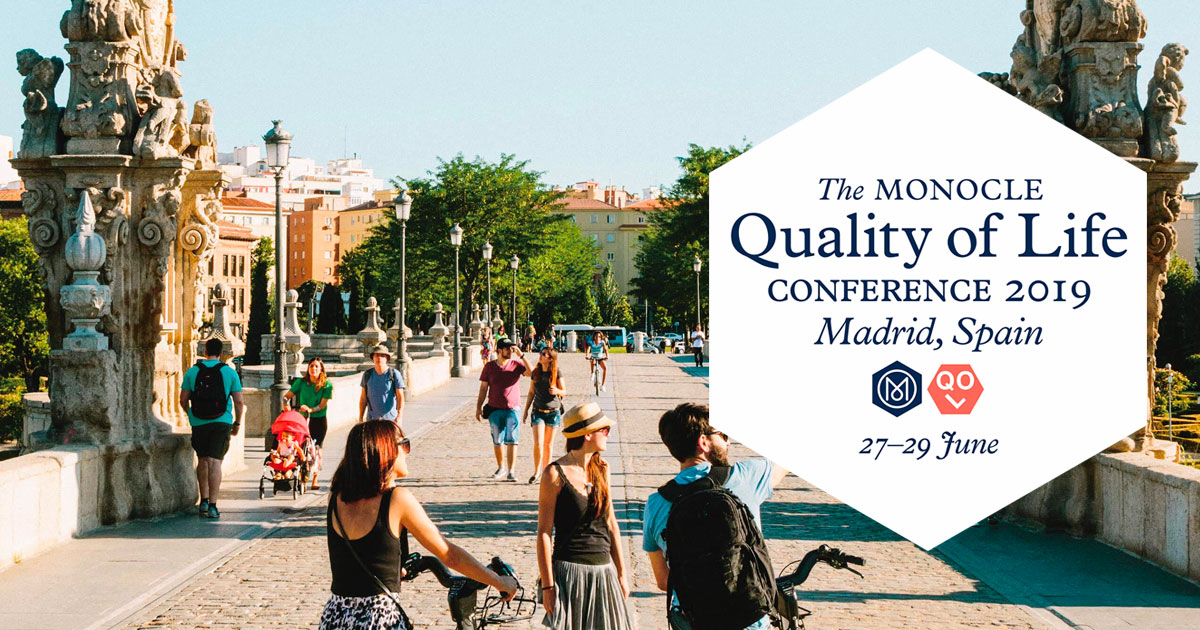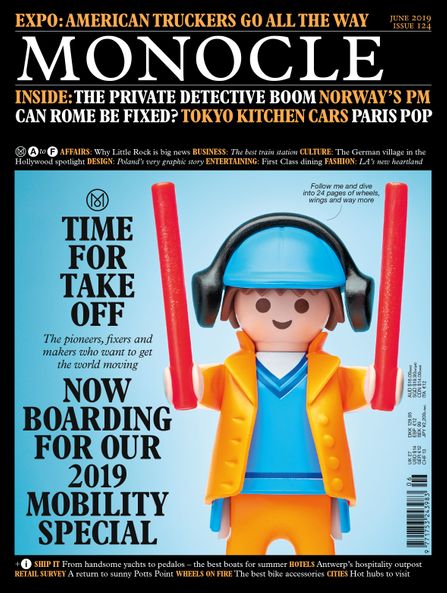A New Language
More Than Just a Magazine
As the editorial director of Monocle, a London-based globally-oriented news and media company, his brief includes the monthly magazine, books, films, multiple radio shows and the yearly Quality of Life Conference, coming up this June in Madrid. To understand what he does, it is important to understand the scope of Monocle’s ambition. This is not a massive media company, yet with their 100 or so employees, they have bureaus on the ground in a half dozen global city centers, broadcast radio 24/7, put on hundreds of small events every year culminating in the Davos-like Quality of Life Conference. (The single best conference we have ever attended.) The through line in all these platforms is a personal yet global viewpoint executed with the utmost level of quality, and with a calming, civilized charm. To read a Monocle piece is to be informed with level-headed insider information, while being delighted with a verbal athleticism not seen in the big media players. It’s Andrew who keeps it on track.

Get info on this year’s Quality of Life Conference in Madrid June 27 here.
Starting Out
His career began at Time Out London, starting as an intern directly out of college, and rising to features editor 9 years later. It was an on-job learning opportunity where he was fortunate to be mentored by sympathetic senior staff. Feeling in need of newspaper experience, he left Time Out for the scrappy and well-named paper The Independent, eventually spending 9 years there. Again, the mentoring of the senior editors helped guide his journey from a magazine writer to understanding what a news story was. Most importantly, “Learning to find the top line in a story, which is something one doesn’t always have in a magazine story. It stretched me, and forced me to look at how we delivered news in fresh ways.”
“The nicest things that happen in life are the people you meet along the way”
Fortuitously, he met 19-year-old Tyler Brûlé at Time Out when Tyler came to pitch a story, and the two of them “got on like a house on fire.” They stayed friends as Tyler went on to launch Wallpaper* and then in 2006, Tyler, when forming the Monocle team, asked Andrew to become the launch editor. It was an obvious don’t hesitate, just say yes opportunity.
Monocle launched in the spring of 2007 with just 9 employees on the editorial side, the beginning of a journey that has seen Andrew’s responsibility expand to 110 people.
Intergenerational Mentoring
Now running a major operation on the other end of the mentoring spectrum as one of the most senior people at Monocle, he finds himself traveling and working with much younger people. “Without trying to sound like some old sage, one of the nicest things anybody can get out of doing their job well is the sense that you’ve helped someone else out, that you’ve helped direct someone else’s career in the right direction. It goes both ways, as I like to seek out some of the quieter people in the office to grab a lunch and find out what they are up to. I love that we can mentor and help young people on their journey, while they can keep me informed of what’s happening with them. It’s a wonderful feeling.”

Social Media is Off the Menu
Monocle is an unusual company in that, rather than reflexively jumping into whatever shiny new medium is the flavor of the day, they carefully weigh these decisions. Social media is not on their menu. “Every brand needs to find the mix of media that is correct for them, and just for us, we don’t feel social is the right way to go. That may be for the simple reason that we feel the social platform are competitive brands to us. For us as a brand, we need to do something different, and wherever possible, bring people into our own world and not one that is mediated by these brands.”
“We actively never say the word millennial”
One of of commonalities AGEIST has with Monocle is the recognition that typing by age is a profoundly bad idea. “We actively never say the word millennial. It is a completely meaningless notion. The idea that one can ascribe the same values and principles to a generation the world over is ridiculous. What does that mean? White guys with beards in half a dozen cities across the world? But it doesn’t really tell you anything.”
“We need to be intergenerational”
The trends of re-urbanization and age are two of the biggest macro trends happening today. This year’s Monocle Quality of Life Conference is happening in Madrid, chosen because of all the cities in Europe, Madrid has the best numbers for longevity. When they investigated why this is, there were the usual markers: a reasonably good diet, a pace of life that is more generous, and most importantly, a vivid intergenerational culture. It’s a place where the old and young freely mix, where young people want to hang out with their grandparents.
“The idea of planning cities for millennials, or on any generation or age, is something we should not do. We need to be intergenerational.”
“We need participation from all genders, races and ages. The city is where the best healthcare, the best conversation and the best entertainment happens. Done well, it is a premier place for older people to live.” Designing with the idea of segregating people as they get older “deprives younger people of the knowledge of how to navigate the world.”
Why Madrid?
QOL is about investigating what makes a city most desirable to live in. For Andrew, it involves the housing options available, and cross-generational mixing is clearly part of the livability of any city. He sees emerging modes of shared ownership and communal living as interesting additions to the mix. QOL looks at a range of factors that make for a good urban experience. Rather than the usual best-of and cost-of metrics, they look at other more experiential factors. Top of Andrew’s list is having a vibrant media presence to articulate the stories of the world, your country and your city, and of course a vital food and design culture. Checking all those boxes, Madrid was chosen this year as the host city.
The Soft-Power Potential of Dogs
Andrew’s editorial guidance is not all towards hard news stories, and finding the perfect city for the perfect conference. There was that time Andrew decided to run a series on the dogs of ambassadors. This involved contacting a number of ambassadors around the world and inquiring into their dogs. It turns out that there is significant soft-power potential in having a notable dog to help facilitate one’s ambassadorial duties. “Because ambassadors often are posted in a variety of stations, and they may accumulate dogs in their travels, they are sometimes accompanied by these packs of pooches. We did a story called Ambass-a-Dogs. It was such fun that we revisited it a year later with another round of dogs. I’m convinced that one day it will be a TV series.”
The ideas expressed here are solely the opinions of the author and are not researched or verified by AGEIST LLC, or anyone associated with AGEIST LLC. This material should not be construed as medical advice or recommendation, it is for informational use only. We encourage all readers to discuss with your qualified practitioners the relevance of the application of any of these ideas to your life. The recommendations contained herein are not intended to diagnose, treat, cure or prevent any disease. You should always consult your physician or other qualified health provider before starting any new treatment or stopping any treatment that has been prescribed for you by your physician or other qualified health provider. Please call your doctor or 911 immediately if you think you may have a medical or psychiatric emergency.
AUTHOR

We will never sell or give your email to others. Get special info on Diet, Exercise, Sleep and Longevity.
